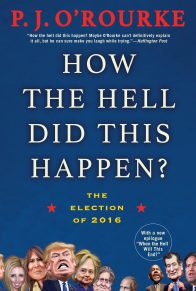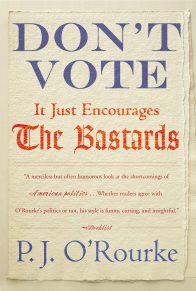Our government gets more than thugs in a protection racket demand, more even than discarded first wives of famous rich men receive in divorce court. Then this government, swollen and arrogant with pelf, goes butting into our business. It checks the amount of tropical oils in our snack foods, tells us what kind of gasoline we can buy for our cars and how fast we can drive them, bosses us around about retirement, education and what’s on TV; counts our noses and asks fresh questions about who’s still living at home and how many bathrooms we have; decides whether the door to our office or shop should have steps or a wheelchair ramp; decrees the gender and complexion of the people to be hired there; lectures us on safe sex; dictates what we can sniff, smoke and swallow; and waylays young men, ships them to distant places and tells them to shoot people they don’t even know.
The government is huge, stupid, greedy and makes nosy, officious and dangerous intrusions into the smallest corners of life–this much we can stand. But the real problem is that government is boring. We could cure or mitigate the other ills Washington visits on us if we could only bring ourselves to pay attention to Washington itself. But we cannot.
During the last presidential campaign deep-thinking do-gooders at some tax dodge called the John and Mary R. Markle Foundation set up a commission to study the electorate and discovered that 49 percent of the public didn’t know Lloyd Bentsen was the Democratic vice-presidential nominee. That is good news for Lloyd Bentsen–he now only has to make 51 percent of the public forget he was ever on the Dukakis ticket. But the Markle commission members were not so pleased. They called the information “astonishing” and claimed it ‘suggests a wide-spread, glacial indifference” to elections.
This is an insult to glaciers. An Ice Age would be fascinating compared with government. We’d be wondering whether to update our snowblowers and trying to figure out if using rock salt to keep ice floes off our driveways would kill the herbaceous borders. We’d be interested if glaciers were the problem. “American voters today do not seem to understand their rightful places in the operation of a democracy,” said the Markle commission. Wrong again. It’s democracy that doesn’t understand its rightful place in the operation of us–to shut up and get out of our faces.
Government is boring because political careers are based on the most tepid kind of lie: “I’ll balance the budget, sort of.” “I won’t raise taxes, if I can help it.” Of course politicians don’t tell the truth: “I am running for the U.S. Senate in order to even the score with those grade-school classmates of mine who, thirty-five years ago, gave me the nickname Fish Face,” or, “Please elect me to Congress so that I can get out of the Midwest and meet bigwigs and cute babes.” But neither do politicians tell huge, entertaining whoppers: “Why, send yours truly to Capitol Hill, and I’ll ship the swag home in boxcar lots. You’ll be paving the roads with bacon around here when I get done shoveling out the pork barrel. There’ll be government jobs for your dog. Leave your garden hose running for fifteen minutes, and I’ll have the Department of Transportation build an eight-lane suspension bridge across the puddle. Show me a wet basement, and I’ll get you a naval base and make your Roto-Rooter man an admiral of the fleet. There’ll be farm subsidies for every geranium you’ve got in a pot, defense contracts for Junior’s spitballs and free day care for Sister’s dolls. You’ll get unemployment for the sixteen hours every day when you’re not at your job, full disability benefits if you have to get up in the night to take a leak, and Social Security checks will come in the mail not just when you retire at sixty-five but when you retire each night to bed. Taxes? Hell, I’ll have the government go around every week putting money back in your paycheck, and I’ll make the IRS hire chimpanzees from the zoo to audit your tax returns. Vote for me, folks, and you’ll be farting through silk.”
Government is also boring because in a democracy government is a matter of majority rule. Now, majority rule is a precious, sacred thing worth dying for. But–like other precious, sacred things, such as the home and family–it’s not only worth dying for; it can make you wish you were dead. Imagine if all of life were determined by majority rule. Every meal would be a pizza. Every pair of pants, even those in a Brooks Brothers suit, would be stone-washed denim. Celebrity diet and exercise books would be the only thing on the shelves at the library. And–since women are a majority of the population–we’d all be married to Mel Gibson.
Furthermore, government is boring because what’s in it for us? Sure, if we own an aerospace contracting company, a five-thousand-acre sugar-beet farm or a savings and loan with the president’s son on the board of directors, we can soak Uncle Sucker for millions. But most of us failed to plan ahead and buy McDonnell Douglas, and now the only thing we can get out of government is government benefits–measly VA checks and Medicare. We won’t get far on the French Riviera on this kind of chump change. Besides, the French look at us funny when we try to buy p”t” de foie gras and Ch”teau Margaux “61 with American food stamps.
Government is so tedious that sometimes you wonder if the government isn’t being boring on purpose. Maybe they’re trying to put us to sleep so we won’t notice what they’re doing. Every aspect of our existence is affected by government, so naturally we want to keep an eye on the thing. Yet whenever we regular citizens try to read a book on government or watch one of those TV public affairs programs about government or listen to anything anybody who’s in the government is saying, we feel like high-school students who’ve fallen two weeks behind in their algebra class. Then we grow drowsy and torpid, and the next thing you know we are snoring like a gas-powered weed whacker. This could be intentional. Our government could be attempting to establish a Dictatorship of Boredom in this country. The last person left awake gets to spend all the tax money.
Boredom isn’t the only problem, of course. American lack of interest in government is well developed, but American ignorance of government is perfect. Almost everything we know about the workings of Congress, the presidency, the Supreme Court and so forth comes from one high-school civics course and one spring vacation when Dad took the family to Washington, DC. On the trip to Washington we learned that the three branches of government are the White House, the top of the Washington Monument and the tour of the FBI Building. In the high-school civics class we learned just how long an afternoon can be made to seem with the help of modern educational methods.
I can remember everything about my civics course–what classroom it was in, who taught it, which of my friends were in the class with me, where I sat and what the brassiere of the girl who sat next to me looked like when I peeked down the armhole of her sleeveless blouse. About the civics I remember nothing. There must have been tiny subliminal messages printed between the lines of my textbook saying, “Go ahead, take another look, she must be a 42D.”
That was twenty-six years ago, but things have not changed much. I got a copy of a current high-school civics book, American Civics, published by Harcourt Brace Jovanovich. I’m told it is one of the nation’s most widely used texts. The heft of the thing, its awkward shape and inept cover art, the glossy, teen-resistant paper–all of this gave me what I can only describe as a backup of the memory’s septic system. I was all of a sudden swamped with powerful, involuntary recollections of dreary class discussions, irksome pop quizzes and desiccated spring afternoons.
American Civics is, of course, completely up-to-date. Its blurry, stilted photographs of people in unfashionable clothes are printed in color instead of black and white. Its page layouts have been tarted up with cartoons, pastel type and USA Today-style lists of “fun facts’ to suit the attention span of the ‘sesame Street” generation. And, dispersed throughout the book, are little boxed items such as this:
CAN YOU GUESS?
One of our Presidents had a serious physical handicap.
Who was he?
Answer is on page 578.
(The answer is not, by the way, “Ronald Reagan and his handicap was Nancy.”)
American Civics has also trimmed its sails to the prevailing ideological winds. It has a section with the infelicitous title “Upsetting America’s Ecology” and another section that says, “The Reverend Jesse Jackson ran a strong campaign for the 1984 and 1988 Democratic Presidential nominations.” There’s a photo of a man in a wheelchair above the caption, ‘disabled doesn’t mean unable,” and in the “Living Documents’ appendix at the end–tossed in with the Mayflower Compact, the Gettysburg Address and the Emancipation Proclamation–is some screed from a women’s rights conference in 1848 called the Seneca Falls Declaration.
What’s more, the authors of American Civics assume their students are as ignorant of everything as they are of government. Thus, among such traditional chapter headings as “How a Bill Becomes a Law” and “Our Federal Court System,” we find “Your Family and You” and–I’m not kidding–”Using Television as a Resource” and–I’m still not kidding–”Civics Skills: Reading a Help Wanted Ad.” (Though I suppose ignorance is relative. Few seventeen-year-olds today need to peek into the armhole of a sleeveless blouse to find out what a brassiere looks like.)
Underneath the moral and typographical frills and lessons in how to use a phone, however, American Civics is the same font of monotony, the same bible of ennui that civics books have always been. I defy anyone to read two paragraphs of it without incurring a strong desire to join Posse Comitatus or the Symbionese Liberation Army or some other group that promises to kill high-school civics teachers. I also defy anyone to read two paragraphs of it and tell me what he just read.
There are, of course, other sources of information on government available to literate adults. I have in my hand–or, rather, in both my hands, because it is 793 pages long and weighs more than a cinder block–The Power Game: How Washington Works by Hedrick Smith. This comes with a gold-foil sticker on its cover saying, “AS SEEN ON PBS.” Just four little words, yet oh how they catch the heart.
The Power Game seems to contain everything that Hedrick Smith, in his long career as a New York Times reporter, has ever heard or seen in Washington, including–I’m not sure about this, but the literary styles are similar–the entire District of Columbia phone book. The Power Game is–and I’m quoting the dust-flap copy so you know I’m telling the truth–”an eye-opening inside portrait of how Washington, D.C., really works today.” It’s a very different kind of book from American Civics. Where American Civics is amazingly boring, The Power Game is . . . words fail me . . . an eye-opening inside portrait of how Washington, D.C., really works today.
Our Founding Fathers lacked the special literary skills with which modern writers on the subject of government are so richly endowed. When they wrote the Declaration of Independence, the Constitution and the Bill of Rights, they found themselves more or less forced to come to the point. So clumsy of thought and pen were the Founders that even today, seven generations later, we can tell what they were talking about.
They were talking about having a good time: We hold these Truths to be self-evident, that all Men are created equal, that they are endowed by their Creator with certain unalienable Rights, that among these are Life, Liberty and the Pursuit of happiness. . ..
“This is living!” “I gotta be me!” “Ain’t we got fun!” It’s all there in the Declaration of Independence. We are the only nation in the world based on happiness. Search as you will the sacred creeds of other nations and peoples, read the Magna Charta, the Communist Manifesto, the Ten Commandments, the Analects of Confucius, Plato’s Republic, the New Testament or the UN Charter, and find me any happiness at all. America is the Happy Kingdom. And that is one good reason why we who live here can’t bring ourselves to read American Civics or The Power Game or even the daily paper.
As it is with us, so it was with the Original Dads. Their beef with Triple George? He was no fun:
He is, at this Time, transporting large Armies of foreign Mercenaries to complete the works of Death, Desolation, and Tyranny, already begun with circumstances of Cruelty and Perfidity, scarcely paralleled in the most barbarous Ages, and totally unworthy the Head of a civilized Nation.
Totally.
There are twenty-seven specific complaints against the British Crown set forth in the Declaration of Independence. To modern ears they still sound reasonable. They still sound reasonable, in large part, because so many of them can be leveled against the present federal government of the United States. Maybe not the ‘death, Desolation, and Tyranny” complaint (unless you’re deeply opposed, on fight-for-your-right-to-party grounds, to coca-plant eradication in Bolivia and Peru), but how about:
. . . has erected a Multitude of new Offices, and sent hither Swarms of Officers to harass our People, and eat out their Substance.
George III was a piker compared with FDR or LBJ.
Or:
. . . has called together Legislative Bodies at Places unusual, uncomfortable, and distant . . . for the sole Purpose of fatiguing them into Compliance with his Measures.
Every American president does that to the House and the Senate.
. . . has refused his Assent to Laws, the most wholesome and necessary for the public Good.
Our Congress won’t pass a balanced-budget constitutional amendment or any legislation banning people over thirty from wearing spandex bicycle shorts.
. . . has endeavored to prevent the Population of these States; for that Purpose obstructing the Laws for Naturalization of Foreigners; refusing . . . to encourage their Migrations hither. . . .
Tell a Vietnamese boat person, a Hong Kong shopkeeper or a migrant worker from Mexico that this doesn’t describe U.S. immigration policy.
. . . has kept among us, in Times of Peace, Standing Armies. . . .
Certainly.
. . . has combined with others to subject us to a Jurisdiction foreign to our Constitution, and unacknowledged by our Laws, . . .
Federal regulatory agencies, for instance.
. . . Depriving us, in many Cases, of the Benefits of Trial by Jury.
If we cross one of those regulatory agencies.
. . . Cutting off our Trade with all Parts of the World
is what our trade quotas and tariffs do.
. . . Imposing Taxes on us without our Consent.
Nobody asked me if I wanted a 1040 Form.
. .. Taking away our Charters, abolishing our most valuable Laws, and altering fundamentally the Forms of our Governments.
So say states rights conservatives.
… has plundered our Seas, ravaged our Coasts . . . and destroyed the Lives of our People.
All the tree huggers believe this.
And lastly:
. . . has excited domestic Insurrections amongst us. . . .
In Watts, Bensonhurst, that Mohawk reservation in upstate New York and my house since I married into a family full of Democrats.
American Civics calls the Declaration of Independence a “living document.” All too true.
The Constitution is an equally forthright piece of work and quite succinct–twenty-one pages (in the American Civics E-Z-reader large-type version) giving the complete operating instructions for a nation of 250 million people. The manual for a Toyota Camry, which only seats five, is four times as long. And, thanks to the pro-growth economic policies of the vigorously libertarian–not to say completely impotent–Continental Congress, the Constitution is not translated from Japanese.
An hour’s perusal of our national charter makes it hard to understand what the argle-bargle is about. The First Amendment forbids any law “abridging the freedom of speech.” It doesn’t say, “except for commercials on children’s television” or “unless somebody says “cunt” in a rap song or “chick” on a college campus.”
The Second Amendment states that “the right of the people to keep and bear arms, shall not be infringed,” period. There is no mention of magazine size, rate of fire or to what extent these arms may resemble assault rifles. All rifles were assault rifles in those days. Furthermore, if the gun laws that Massachusetts has now had been in force in 1776, we’d all be Canadians, and you know what kind of weather Canada has.
There is no reference to abortion whatsoever in the Constitution, not so much as an “I’ll pull out in time, honey, honest.” The Tenth Amendment tells us that “the powers not delegated to the United States by the Constitution, nor prohibited by it to the States, are reserved to the States respectively, or to the people.” This means the power to drive the nation crazy over a gob of meiotic cells that wouldn’t fill a coke spoon and, on the other hand, the power to murder innocent babies that haven’t even been born yet are–just as the amendment says–’reserved to the States respectively, or to the people.”
The Constitution is not hard to understand. Although the quality of reasoning degenerates in the later amendments. The Sixteenth Amendment is particularly awful:
The Congress shall have the power to lay and collect taxes on incomes, from whatever source derived. . . .
And Section 4 of the Fourteenth is very silly:
The validity of the public debt of the United States, authorized by law, . . . shall not be questioned.
The Twenty-Sixth Amendment, giving the vote to eighteen-year-olds, must have been drafted by people who’d never met any eighteen-year-olds or, worse, by people who were eighteen.
And then there is the–from a male point of view–tactically foolish Nineteenth Amendment:
The right of citizens of the United States to vote shall not be denied or abridged by the United States or any State on account of sex.
This made women stop protesting a trivial wrong to their gender–exclusion from the electoral process–and allowed them to focus their indignation on more serious forms of injustice, such as the fact that women suffer discrimination and harassment in the workplace, are paid less than men, are rarely promoted to the highest levels of corporate or professional responsibility and this year’s hemlines make their legs look fat.
There are also a few gimmicks and dodges in the Constitution, such as Section 4 of the presidential disability and succession amendment, which says that the vice president “and a majority of either the principal officers of the executive departments or of such other body as Congress may by law provide” (italics my own) can declare the president incompetent. If I’m reading this right, it means that with the help of pals in the House and Senate, Dan Quayle and the principal officers of the Fort Wayne, Indiana, Elks Club can send George Bush to the bughouse and declare a national golf emergency.
But, on the whole, the text is easily glossed. The single exception being Article Two, Section 1:
The electors shall . . . vote by ballot for two persons. . . . The person having the greatest number of votes shall be the President; . . . and if there be more than one who have such majority, and have an equal number of votes, then the House of Representatives shall immediately choose by ballot one of them. . . .
This was later modified by the rather more confusing Twelfth Amendment:
. . . The person having the greatest number of votes for President, shall be the President, if such number be a majority of the whole number of Electors appointed; and if no person have such majority, then from the persons having the highest numbers not exceeding three on the list of those voted for as President, the House of Representatives shall choose immediately, by ballot, the President.
The idea seems to be to make the election of a president so complicated and annoying that no one with an important job or a serious avocation–that is, no one presently making any substantial contribution to society–would be tempted to run for the office. So far, it’s worked.
Otherwise, only one important question is raised by the Constitution, a question implicit in its preamble:
We the people of the United States, in order to form a more perfect Union, establish justice, insure domestic tranquility, provide for the common defense, promote the general welfare, and secure the blessings of liberty to ourselves and our posterity . . .
The question being, “Are we done yet?”
The first objective was achieved in 1865 when we squashed the rednecks and peckerwoods. The result was a definitely more perfect union. Compare it, for example, with the Union of Soviet Socialist Republics or the AFL-CIO. We’ve established about as much justice as the country can stand–maybe more, to judge by the verdict in the Marion Barry trial and some of the sentences handed to the Iran-contra conspirators. (Perfect justice being a thing none of us would care to confront.) Domestic tranquility we don’t have, but how we’d get any without violating every clause of this document that is supposed to ensure it I can’t imagine. The common defense is so well provided for that even such uncommon things as Saudi Arabians are defended by it. In the matter of promoting the general welfare, we have–to judge by the welfare rolls–done it too well. The blessings of liberty are so manifestly secured to ourselves that we seem weighed down by the things, and lately are attending AA meetings, joining religious congregations and formulating personal diet and exercise regimens to ease the burden. And, as for posterity, that’s why birth control was invented.
So when can we quit passing laws and raising taxes? When can we say of our political system, ‘stick a fork in it, it’s done”? When will our officers, officials and magistrates realize their jobs are finished and return, like Cincinnatus, to the plow or, as it were, to the law practice or the car dealership? The mystery of government is not how Washington works but how to make it stop.















